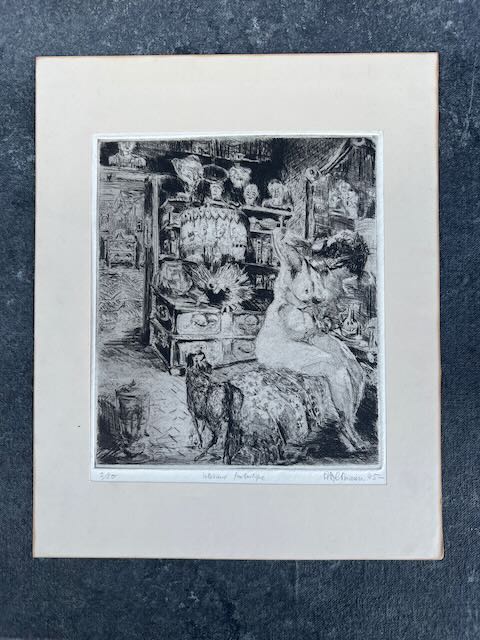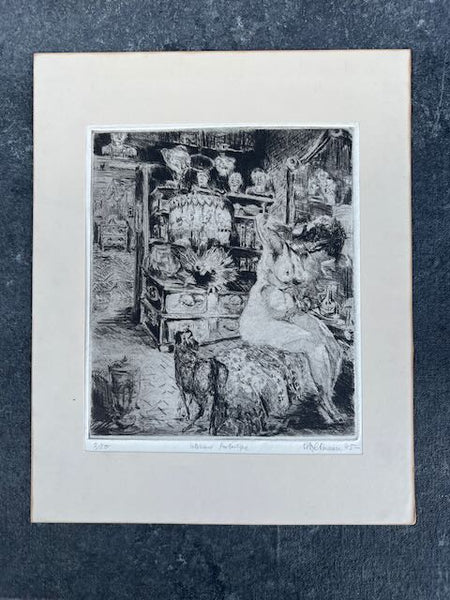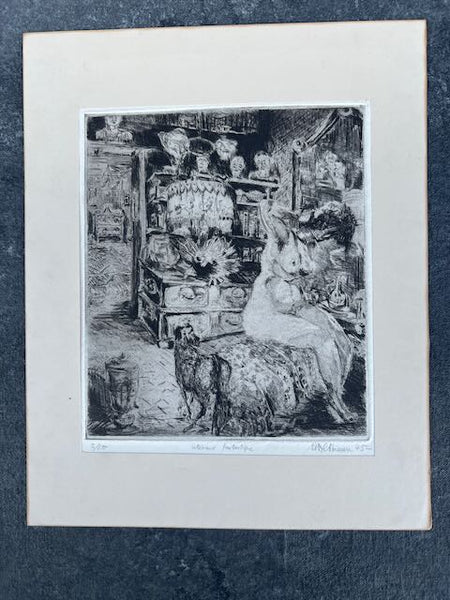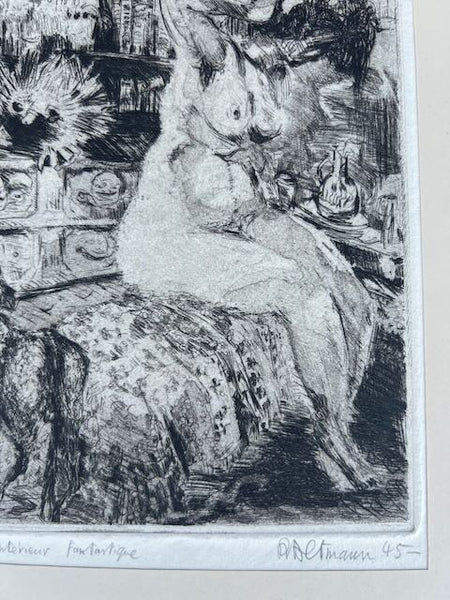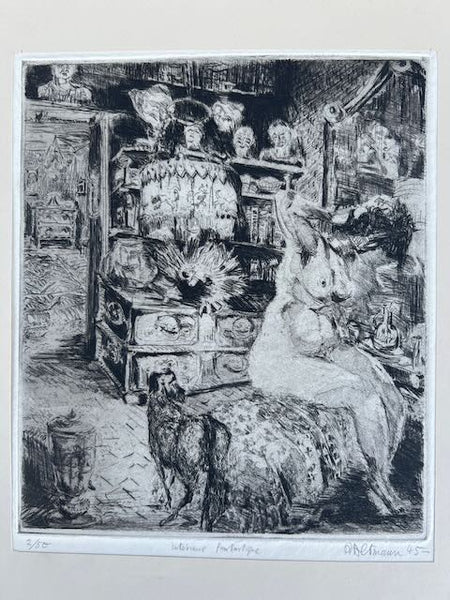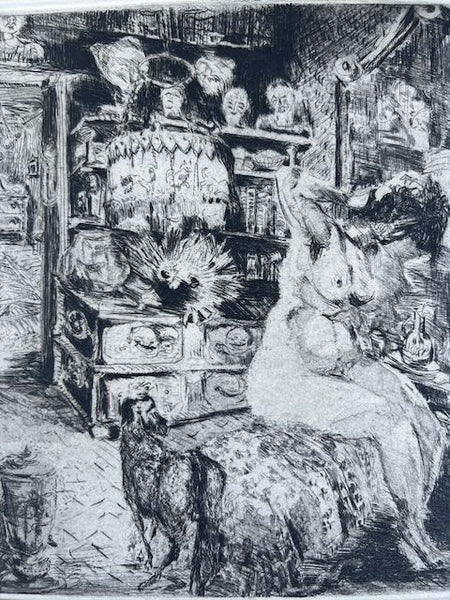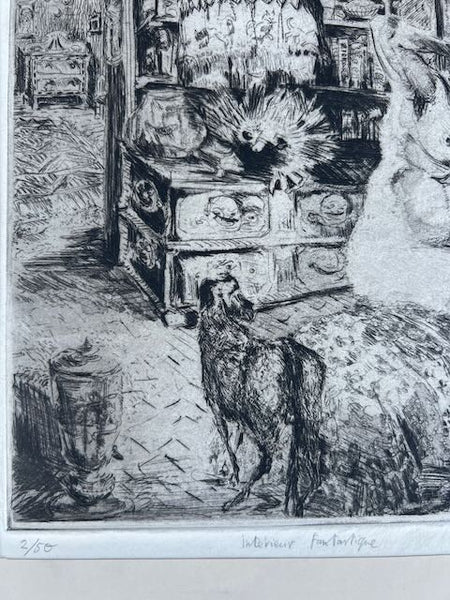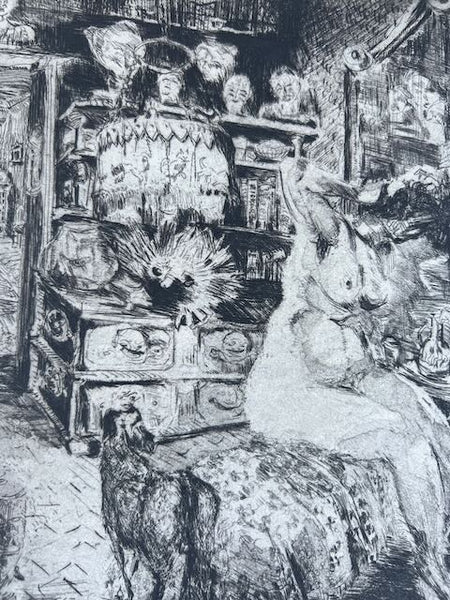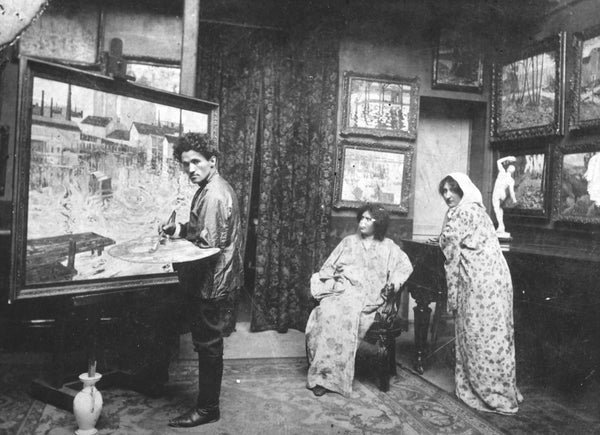Alexandre Altmann -Seated Nude in Phantasmagorical Room: Intérieur Fantasque - Etching 1945 AP1766
This is a marvel from a highly original artist. Signed and numbered 2/50. We have appended a photo of him in his studio.
Alexandre (Alexander) Altmann was born to a Jewish family in the village near Kiev. At the age of 11 he left his home and later reached Odessa. In order to earn his living he worked as a tailor, shoemaker, metalworker and grocery store clerk until becoming acquainted with the painter Doroshevich. Doroshevich recognized the talent of the young man and advised him to study painting. Since Altmann did not find the opportunity to study in Ukraine, he left his homeland for Austria at the age of 20. Soon though, he left Vienna and made his way to Paris. He took any work and worked even at night in order to survive and to study painting. He needed brushes and paint and in the daytime when museums were open he copied paintings of Old Masters in the Louvre.
One day when he fainted from hunger and was taken to Rothschild hospital, Altmann painted a portrait of another patient, a poor old man. Unexpectedly, someone of the hospital bought that portrait and paid a lot of money to the young painter. Altmann used this money to enroll in the Academy Julian in the mid 1900. For a small fee students of the Academy could get advice of famous painters, in particular W.–A. Bouguereau and J. M. Bocher, and they could draw from nature.
The Academy did not confer diplomas. When Altmann decided that he had studied everything that this institute could give, he left academic studies and devoted all his time to his favorite subject — landscape. He painted the side streets of Paris, views of its suburbs and small seaside towns, the Atlantic coast. He even began to paint still lives. His impressionist works were decorative and spectacular. There was a freedom in everything: in texture, in dabs of paint, in the bright contrasting palette.
The first solo exhibition of Altmann’s painting was held in 1908. Then he exhibited his works at the Paris salons — Salon des Indépendants (1910–1920), Tuileries (1908) and Salon d’Automne (1908–1924). In 1909 Altmann submitted some of his paintings for exposition of the first Salon of Vladimir Izdebsky in Odessa, and then in Kiev. The exhibition included the works of all existing art schools — from the Itinerants to les Fauves and Cubists — and was a great success.
Altmann's paintings were not famous at that time compared to the works by the Avant-garde at this international exposition. But it was at that time that he got enthusiastic about the idea of a solo exhibition in St. Petersburg. But the law made it impossible and Altmann never returned to Russia.
In 1912, a three person exhibition of work by Altmann, D. O. Widhopff and N. L. Aronson was held. At this exhibition the French government purchased two of his winter landscapes for the Luxembourg Palace Museum. Gradually, Alexander Altmann's life, full of past hardship, improved.
Although Altmann was inspired by the style and spirit of Impressionist painting, he did not imitate masters and had acquired a fine reputation as a sensitive painter, a master of city landscape.
Art historians could not determine the exact dates of Altmann’s life. The painter usually did not date his works. There is different information about the year of his birth (1878, 1885) and the year of his death (1922, 1932, 1950) in publications. It happened that in auction catalogues there were two painters: Alexander Altmann (1878–1932) and Alexander Altmann (1885–1950). According to recent research, Alexander Altmann, representative of pre-revolutionary wave of expatriate Russian painters, was born in 1885 and died in 1950.
Source:
http://www.elysium.ru/en/painters/37.html

